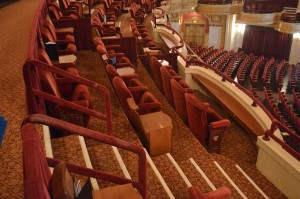Community, Leadership, Experimentation, Diversity, & Education
Pittsburgh Arts, Regional Theatre, New Work, Producing, Copyright, Labor Unions,
New Products, Coping Skills, J-O-Bs...
Theatre industry news, University & School of Drama Announcements, plus occasional course support for
Carnegie Mellon School of Drama Faculty, Staff, Students, and Alumni.
CMU School of Drama
Monday, January 14, 2019
Making a Night (or Day) of it: Food in the Performing Arts Center
theatreconsultants.org: Food culture in the U.S. has evolved, in a good way, over the past two decades. The evolution has caught up to the performing arts, which are now placing a priority on the integration of high-quality food, drink, and dining experiences for audiences.
Subscribe to:
Post Comments (Atom)

4 comments:
From a business perspective, the integration of concessions into their facilities is very smart. I can only speak from more personal experience, but my hometown is known for its brewing of alcoholic beverages, and for many people their evening activity is to drink and go to the theater. By theater's providing patrons with drinks in the theater, they now have two sources of revenue. I know that in some theaters while they have concessions, food and drink are still not allowed in the theater itself. This makes sense, because as the article mentions, there are more cleaning costs to take into consideration. I always hated cleaning up the seats after shows at my local theater, finding half consumed cups of wine, and although it was rare, the occasional spill. The article included a photo of chairs with cup holders attached to them. Something about this just seems odd, because in my mind, I think about concessions being available for sporting events, concerts, or the circus. It seems out of place to see cupholders being used during an opera, or a play. While I am not against food and drink being sold in performing arts centers (I think it adds for a more enjoyable experience), I think that it shouldn't take over the facility itself. I wouldn't want the food to be better than the show.
I think that the integration of food and drinks into theatres could be a great idea. Not only would they be generating money from selling tickets for shows, but extra profits from the food offered. In my High School theatre, we regularly sold candy, snacks and bottled water to the audience members. The possibility of anything getting ruined from the liquids was incredibly low, since water doesn’t do much damage in that small of a quantity, it’s easy to clean up, and it has a cap so less of a chance of being spilled. I can understand not allowing for certain foods or drinks that could get really messy though. We’ve had incidents with soda being spilled and that’s never any fun to deal with.
Aside from the prospect of making money, food and drink can also help bring the audience into the wold of the play/musical. If the concessions are themed to fit the location and time of the play, then it could serve as another way to make the people watching it feel more connected. An example of this would be how the cast of Great Comet would hand out pierogies at the beginning of the show, and there was a bar where adults could get alcoholic drinks as well. These really helped add to the experience, and I think that other kinds of shows could benefit from this as well. (Though maybe not something like Sweeney Todd…)
This article was a fascinating read! I definitely agree with the author when they claim that foodie culture is on the rise- I consider myself to be a foodie, and enjoy investigating new cuisine and the cultures they come from. The movement of food culture into the entertainment scene seems like an entirely logical paradigm shift. Beyond just acting as a new stream of revenue, it also increases the enjoyment of audience members. Additionally, food can serve as another window into the world of the play. Cuisine is a significant factor in a number of cultures and historical periods. By serving relevant cuisine instead of chocolate bars and cans of pop, audiences can be further engaged in the story that we as artists are trying to tell. Though detractors of concessions in the theatre will argue that it introduces higher cleaning costs, these increased costs are only a small fraction of the increased reveneue. As such, concessions in the theatre create a net profit with only a smidge of extra work.
This article was not entirely thorough concerning the ways in which dining is really becoming a part of the theater-going experiences, but the overall impression that I took away was that the trend of elevated food and beverage concessions are proving to be well worth the investment from a business perspective. My main confusion was that the article didn’t go into the ways in which food and drink could potentially disrupt the viewing experience. If an audience member has to wrestle with a fork and knife during a show, their eyes are taken off the stage for more than just a moment. Eating pungent, messy, or crunchy foods could disrupt other audience members’ experience. These details may sound a bit trivial, but I can easily see how little complaints in reaction to instances like these could multiply quickly. I worry that the popularity of “nicer” meals in the theater takes away from both parts of the experience.
Post a Comment